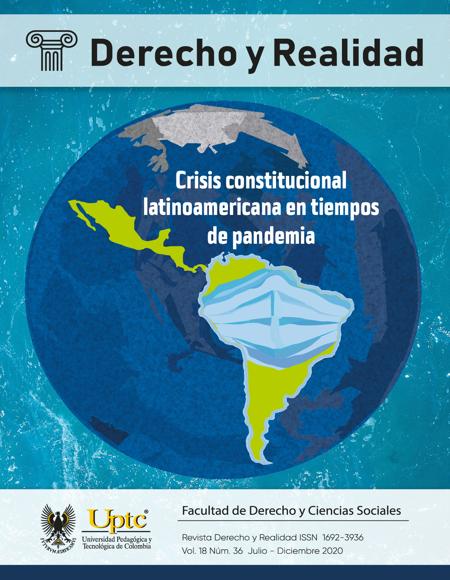The crisis of representative democracy and the tendencies towards a hyper-presidentialism, an analysis of the Mexican case

Abstract
This article analyzes one of the central issues for modern constitutionalism: the control of power. With the crisis provoked by COVID-19, it has put all the world's democratic institutions in check. This has caused the temptation of strong presidents to resurface, or even to reach out to authoritarian presidentialisms under the argument of being able to respond better to the challenge. The methodology used for this research will be qualitative, in the sense that the resulting analysis is based on the study in various texts of the famous metaconstitutional faculties that have had an impact on constitutional reality. Likewise, the results of 2018 will be analyzed, considering that it could detonate the meta-constitutional faculties of the Mexican resident. As a result of the research, the importance of the study of the constitutional debate in the Weimar Republic, during the Between Wars period, is proven. It is considered the most rigorous and has contributed the most to juridical sciences. There we can fall into the juridical positivism of Kelsen, the decisionism of Schmitt, the integrationist of Smend, or the methodology of the constitutional sciences of Heller.
Keywords
COVID-19, Presidentialism, Constitution, Mexico, pandemic, Latin America.
Author Biography
Víctor Alejandro Wong Meraz
Doctor en Derecho Constitucional por la Universidad Complutense de Madrid, miembro del Sistema Nacional de Investigadores Nivel I. Profesor Investigador de la Universidad Autónoma del Estado de México.
References
- AA.VV. (2010). Teoría de la Constitución, Estudios en Homenaje al Dr. Jorge Carpizo
- en Madrid. México: Porrúa.
- ARENDT, H. (2017). Los Orígenes del Totalitarismo. Madrid: Alianza Editorial.
- BOBBIO, N., (1992). El Futuro de la Democracia. México: FCE.
- BURKE, E. (1996). Textos Políticos. México: FCE.
- CARPIZO, J. (2009). Concepto de Democracia y Sistema de Gobierno en América Latina. México: UNAM.
- CARPIZO, J. (2004). El Presidencialismo Mexicano. (18ª ed.). México: Siglo XXI.
- CARPIZO, J. (2004). La Constitución Mexicana de 1917. (14ª ed.). México: Porrúa.
- CARRÉ DE MALBERG, R. (1988). Teoría General del Estado. (2ª ed.). México:FCE.
- CONSTANT, B. (1989). Escritos Políticos. Madrid: Centro de Estudios Constitucionales.
- DAHL, R. (1989). Democracy and its Critics. E.U.A.: Yale.
- DI TELLA, T. (1988). Crisis de la representatividad y sistema de Partidos Políticos. Argentina: Grupo Editorial Latinoamérica.
- DUVERGER, M. (1970). Instituciones Políticas y Derecho Constitucional. (5ª ed.). España: Ariel.
- FERNÁNDEZ-MIRANDA CAMPOAMOR, C. y FERNÁNDEZ-MIRANDA CAMPOAMOR, A. (2003). Sistema electoral, Partidos Políticos y Parlamento. Madrid: Colex.
- GUASTINI, R. (2000). Rigidez Constitucional y límites a la Reforma en el Ordenamiento Italiano. Jurídica, Anuario del Departamento de Derecho Universidad Iberoamericana, (30), 175 – 194.
- HAMILTON, MADISON y JAY. (1974). The Federalist. E.U.A.: The University of Texas.
- HELLER, H. (1983). Teoría del Estado. México: FCE.
- HELLER, H. (1995). La Soberanía. (2ª ed.). México: FCE.
- HELLER, H. (2006). Europa y Fascismo. Granada: Comares.
- JELLINEK, G. (2000). Teoría General del Estado. México: FCE.
- KELSEN, H. (1979). Teoría General del Estado. México: Editora Nacional.
- KELSEN, H. (1999). ¿Quién es el Defensor de la Constitución? (2ª ed.). Madrid: Tecnos.
- KELSEN, H.(2002). Esencia y Valor de la Democracia. (2ª ed.). México: Colofón.
- KELSEN, H. (2005). Teoría Pura del Derecho. (14ª ed.). México: Porrúa
- LEPSIUS, O. (2008). El Redescubrimiento de Weimar por parte de la doctrina del derecho Público de la República Federal. Revista Historia Constitucional, (9), 259 - 295.
- LOEWENSTEIN, K. (1986). Teoría de la Constitución. Barcelona: Ariel.
- MICHELS, R. (2003). Los Partidos Políticos. (Vol. II). Argentina: Amarrortu Editores.
- MONTESQUIEU. (2000). Del Espíritu de las Leyes. (5ª ed.). Madrid. Tecnos.
- NOHLEN, D. (2009). La Democracia Instituciones, Conceptos y Contexto. Colombia: Pontificia Universidad Javeriana.
- PECES BARBA, G. (1993). Derecho y Derechos Fundamentales. Madrid: CEC.
- PECES BARBA, G. (2004). Lecciones de Derechos Fundamentales. España: Dykinson.
- PÉREZ LUÑO, A.E. (2001). Derechos Humanos y Estado de derecho y Constitución. Madrid: Tecnos.
- PLATÓN. (2006). La República. Madrid: CEPC.
- PITKIN, H. (1986). El Concepto de Representación. Madrid: Centro de Estudios Constitucionales.
- RUIPÉREZ, J. (2005). “Estudio Preliminar”, en La Reforma Constitucional, la organización territorial del Estado, la Unión Europea y la igualdad de Género. Madrid: Biblioteca Nueva.
- RUIPÉREZ, J. (2014). Reforma versus Revolución, Consideraciones desde la Teoría del Estado y de la Constitución sobre los límites materiales a la revisión constitucional. México: Porrúa.
- SCHMITT, C. (1982). Teoría de la Constitución. Madrid: Alianza Editorial.
- SCHMITT, C. (2001). Teólogo de la Política. México: FCE.
- SMEND, R. (1984). Constitución y Derecho Constitucional. Madrid: CEC.
- STUART MILL, J. (2007). Del Gobierno Representativo. (4ª ed.). Madrid: Tecnos.
- TARNAWSKI GESLOWSKA, E. (1994). El Tiempo en las Democracias Inciertas. Revista de Estudios Políticos, (86), 153 - 193.
- VEGA GARCÍA, P. de. (2000). La Reforma Constitucional y la Problemática del Poder Constituyente. (5ª ed.). Madrid: Tecnos.
- VEGA GARCÍA, P. de. (2003). La Democracia como proceso. (Consideraciones en torno al republicanismo de Maquiavelo). Revista de Estudios Políticos, (120).
- VEGA GARCÍA, P. de. (1985). Significado Constitucional de la Representación Política”. Revista de Estudios Políticos, (44), 7 - 43.
- VERGOTTINI, G. de. (2004). Derecho Constitucional Comparado. México: UNAM.
- WONG MERAZ, V. A. (2010). Constitución Mexicana, Reforma y Mutación. México: Porrúa.
- WONG MERAZ, V. A. (2010). (2014). La Reforma Constitucional como defensa de la Constitución de 1917. Un análisis desde la problemática del Poder Constituyente y las ideas de Libertad y Democracia. Anuario da Facultade de Dereito da Universidade da Coruña, (18), 195 - 226.